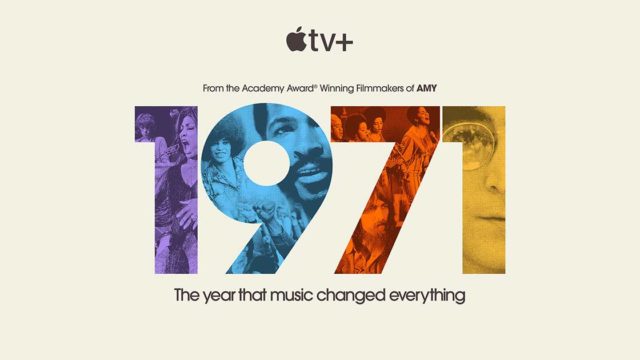Watch: Apple TV+’s ‘1971: The Year That Music Changed Everything’

21 May sees the Apple TV+ premiere of 1971: The Year That Music Changed Everything, an immersive new docuseries exploring the musicians and soundtracks that shaped the culture and politics of 1971. The eight-part series is executive produced by Academy, BAFTA and Grammy Award winners Asif Kapadia (Amy, Senna) and James Gay-Rees (Amy, Senna, Exit Through The Gift Shop).
An deep-dive into a pivotal moment, rich with archival footage and interviews, 1971: The Year That Music Changed Everything, will show how the musical icons of the time were influenced by the changing tides of history; and, in turn, how they used their music to inspire hope, change and the culture around them. The series will examine the work of some of the most iconic artists of the time, who were producing music that resonated then and to this day, including Aretha Franklin, Joni Mitchell, Curtis Mayfield, The Rolling Stones, Bob Marley, Marvin Gaye, The Who, Alice Cooper, Lou Reed and more.
The series was inspired by music journalist David Hepworth’s book, 1971: Never a Dull Moment. According to Gay-Rees, “When we first engaged with David Hepworth, who wrote the book, I remember sitting in a room with him as he gave me the context of what was happening socially and politically that year, alongside which albums were coming out that year. And, like a lot of people, I’m a massive fan of some of the artists we feature in the series. But it was a slightly jaw-dropping moment, because the list just seemed to never end, and I couldn’t believe that all those records came out of that one year. I mean, some of these months alone are kind of iconic moments for music.
“Also, having made a lot of archive films,” Gay-Rees adds, “I got very excited very quickly about how good the archive (footage) would look, because for me, for my personal tastes, it’s the peak moment in fashion as well. It’s the end of the 60s, and it’s before the 70s gets too kind of garish. It’s a brilliant tipping point in fashion as well. If you’ve made as many archive films as Chris (King) and I have, you start thinking, God, this could be a real sort of gold rush here.”
“And then it became very apparent to us that there just were a lot of ideas that are still very resonant today that we thought would be really worthy of investigation. And this wonderful interplay between the music and the society of the time, and thinking. ‘Why then? Why did music respond so vividly to what was going on in the world then, (to the point that) the music did in fact impact society, as well as society impacting music?’ I don’t think that’s happened in quite that same way since then. So we thought it was very worthwhile to shine a light on what that chemistry was.”

